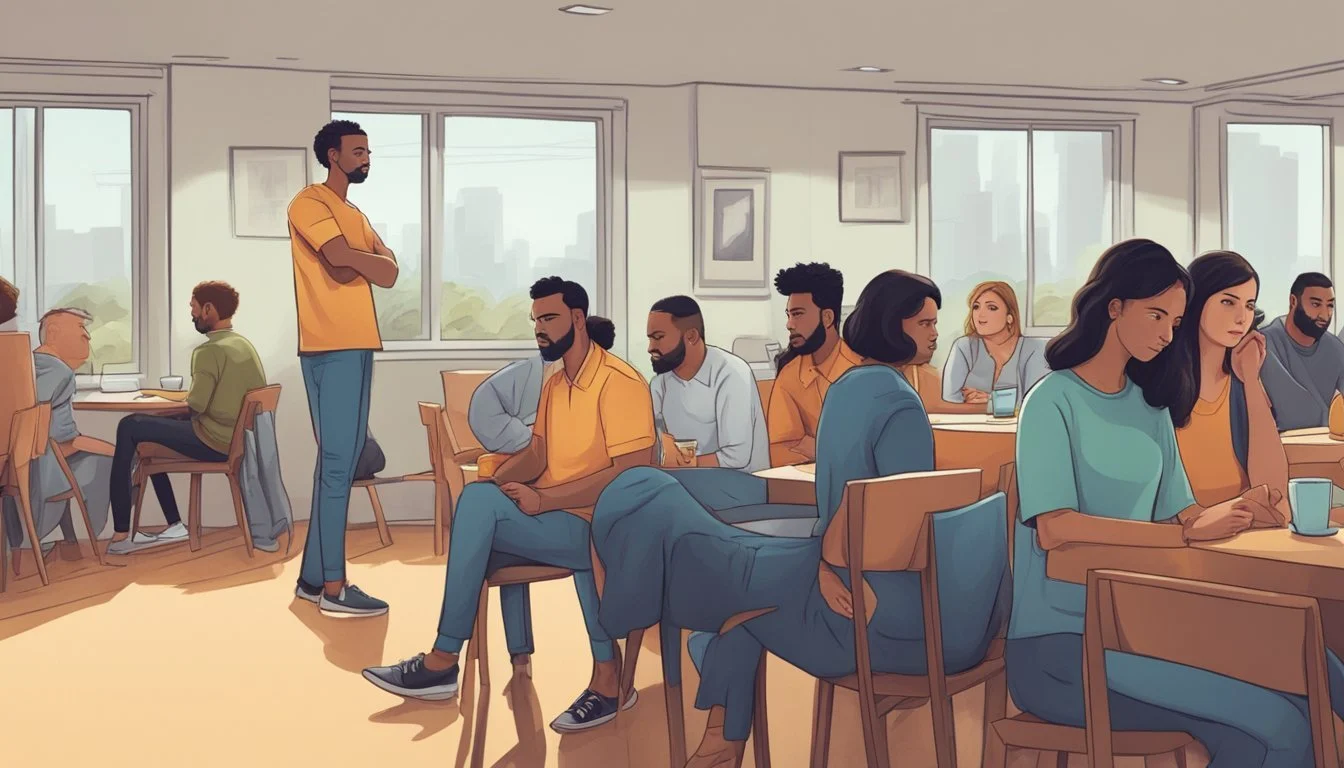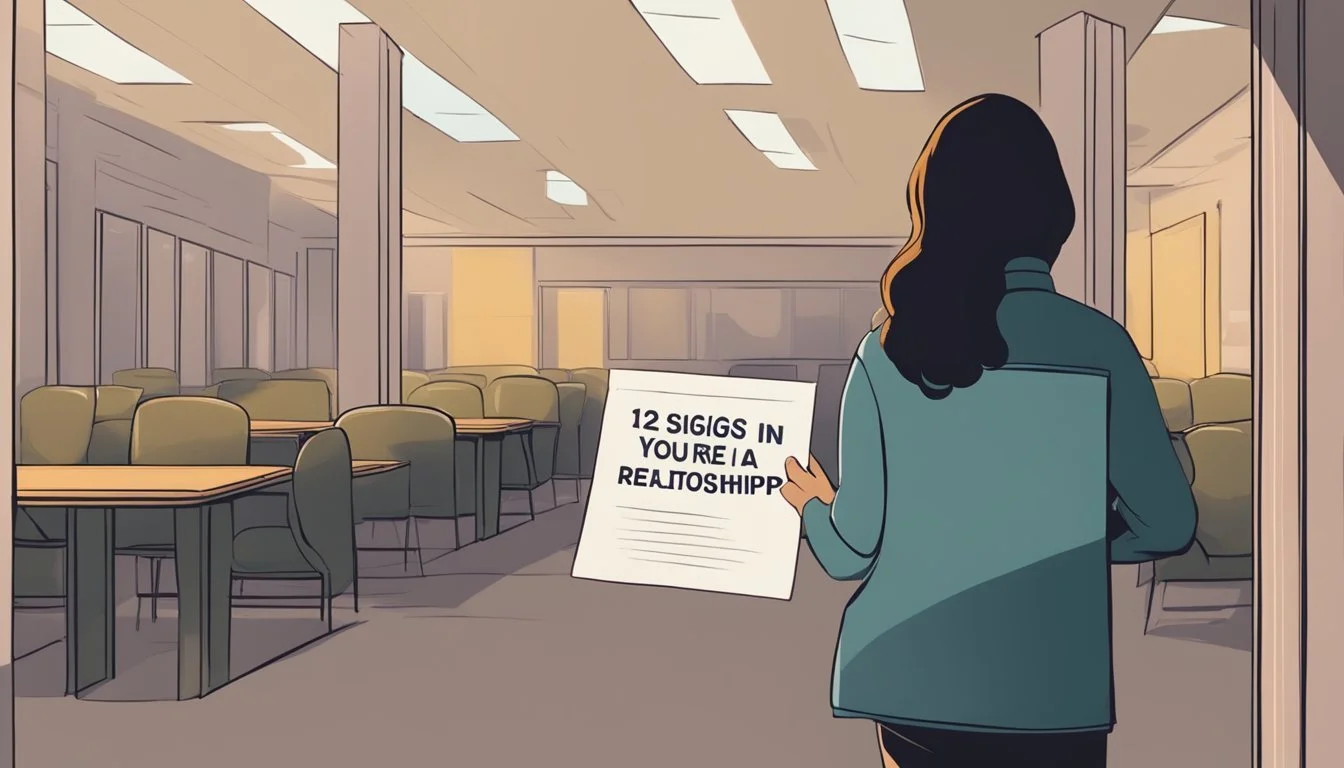12 Signs You're in a One-Sided Relationship
Key Indicators and Solutions
Relationships require effort, understanding, and mutual respect from both parties involved. Unfortunately, not all relationships meet these criteria, often leading one person to feel more invested than the other. These imbalances can cause significant emotional strain and confusion.
Identifying the signs of a one-sided relationship can provide clarity and empower individuals to make informed decisions about their emotional well-being. This article will explore key indicators that may suggest an unequal commitment, helping readers recognize and address such issues.
1) They cancel plans last minute frequently.
A frequent sign of a one-sided relationship is when one person often cancels plans at the last minute. This behavior can create feelings of disappointment and frustration. Consistently unreliable actions demonstrate a lack of commitment and respect for the other person's time.
Notice if you are always the one adjusting or rescheduling. This can signal that the other person prioritizes other commitments over plans with you. Over time, this can erode trust and lead to feelings of neglect.
Such inconsistency in keeping plans can also indicate that the relationship is not a priority for them. It shows an imbalance where one person puts in more effort, while the other seems indifferent. If you find this pattern repeating, it might be worth addressing the issue directly.
2) Your feelings and needs are often ignored.
In a one-sided relationship, one key indicator is that your feelings and needs are often dismissed or overlooked. This can manifest in various ways, such as when your partner rarely asks about your day or doesn't seem interested in your emotions.
Being ignored in this manner can make one feel undervalued. When you share your concerns or needs, and your partner either brushes them off or fails to acknowledge them, it indicates a lack of mutual respect and care.
Another sign is when your partner shows little empathy towards your struggles. For instance, if you're going through a difficult time and they don't offer support or comfort, it reflects an imbalance in the relationship.
You may also find yourself adjusting your needs to accommodate theirs, with little to no reciprocation. This lack of balance can lead to feelings of resentment and loneliness.
Emotional neglect in a relationship can erode self-esteem and create an environment where you're hesitant to voice your needs. The consistent disregard for your emotional well-being is a strong signal that the relationship lacks the necessary basis of mutual respect and support.
For additional signs that your emotions might be neglected, refer to signs of a one-sided relationship.
3) You initiate most of the conversations.
In a one-sided relationship, you may notice that you're the one who consistently reaches out to communicate. Whether it's through text messages, phone calls, or in-person conversations, the effort often comes from you. This can be a red flag indicating imbalance.
Feeling like the driving force behind most interactions can lead to frustration and resentment. When your partner does not reciprocate the effort, it signals a lack of investment in maintaining the relationship.
This dynamic can result in emotional fatigue. Constantly initiating contact without receiving the same level of effort can be disheartening. It leaves you questioning your partner's commitment and interest in the relationship.
If you find yourself always making the first move to communicate, it might be time to reassess the relationship's balance. Regular communication should be a shared responsibility, demonstrating mutual interest and care.
4) They rarely apologize or take responsibility
In a one-sided relationship, one partner might rarely apologize or acknowledge their mistakes. This can leave the other person feeling undervalued and disrespected.
When conflicts arise, the responsible partner often finds themselves saying "sorry" to keep the peace, even if they're not at fault. This could indicate an imbalance in accountability.
A lack of genuine apologies can further strain the relationship. It implies that the other person is not willing to recognize or reflect on their behavior. This can result in unresolved issues piling up over time.
If one partner never admits fault, it places an emotional burden on the other. It is a sign that the relationship lacks mutual respect and understanding.
Partners should strive to understand their mistakes and openly communicate about them. Acknowledging errors and apologizing demonstrates a willingness to improve and nurture the relationship.
5) You feel emotionally drained after interactions
Feeling emotionally drained after interactions with a partner can be a significant sign of a one-sided relationship. This occurs when one partner expends most of the emotional energy while the other remains passive or disengaged.
Over time, this imbalance can leave a person feeling perpetually exhausted and unable to engage fully in other aspects of their life.
In such a relationship, the emotionally drained partner might notice that they are always the one providing support, empathy, and understanding. They may struggle to find the same level of support from their partner. Continually giving without receiving can lead to feelings of frustration and depletion.
Emotionally draining interactions may also be accompanied by a sense of walking on eggshells. The emotionally drained person might constantly worry about saying or doing the wrong thing, adding to their stress and fatigue.
Reading about the signs of an emotionally draining relationship can offer insight and identify if a relationship is truly one-sided. Recognizing these patterns is crucial in taking steps towards improving the situation or seeking support.
Awareness of these dynamics is the first step toward addressing and potentially improving the relationship.
6) Their interests always take precedence
In a one-sided relationship, one partner’s interests and preferences often dominate. They always choose the activities, movies, or restaurants. The other person rarely, if ever, gets a say.
This behavior can extend to more significant aspects such as career decisions or major life choices. You might find that your goals and desires are sidelined. This consistent prioritization can lead to feelings of resentment or being undervalued.
An imbalance like this reveals a lack of mutual respect and consideration. A healthy relationship requires both individuals to make compromises and share decisions. It’s important for both partners to feel their interests are valued equally.
For further information, visit mindbodygreen's article on one-sided relationships.
7) They don't make an effort to know your friends or family.
In a balanced relationship, both partners show interest in each other's social circles. When one person avoids meeting the other's friends or family, it can signal a lack of commitment or interest.
Feeling disconnected from your partner's loved ones can create a sense of isolation. Relationships thrive on shared experiences, and knowing each other's friends and family builds a stronger bond.
If your partner regularly refuses invitations to family gatherings or social events, it might indicate they aren't fully invested. Their lack of involvement may also suggest they don't see the relationship as serious.
Communicating about friends and family provides deeper insights into each other's lives. Without this connection, it's harder to understand each other's background, values, and experiences.
Relationships require effort from both sides. When your partner doesn’t reciprocate by engaging with your social circles, it can be disappointing. This behavior suggests they aren’t prioritizing your relationship.
Understanding the importance of integrating into each other's lives helps build mutual respect and support. If you notice a consistent pattern where they avoid such efforts, it’s a sign worth addressing. For more on how to identify these patterns, visit this comprehensive guide on one-sided relationships.
8) You give more than you receive.
In a one-sided relationship, one partner often feels like they are giving much more than they are receiving. This can manifest in various ways. For instance, you might find yourself always being the one to plan dates, make sacrifices, or accommodate your partner’s needs.
Emotional support is another area where imbalance can be evident. You may frequently lend a listening ear or provide comfort during tough times, but notice that this effort is not reciprocated when you need support.
Practical gestures can also highlight this disparity. If you are constantly the one running errands, handling chores, or managing responsibilities, it may suggest that your contributions to the relationship are not equally matched.
Such imbalances can lead to feelings of resentment and exhaustion. The constant effort without sufficient return can be draining and may also affect your self-esteem. Recognizing this pattern is crucial for addressing and improving the relationship dynamics.
Communication plays a vital role in resolving this issue. Open and honest discussions can help in establishing a more balanced exchange where both partners feel valued and supported. Understanding and addressing these imbalances can lead to a healthier and more fulfilling relationship.
9) They keep you away from their personal life.
In a one-sided relationship, one person might limit their partner's access to their personal life. This can include avoiding introductions to family or close friends. When asked, they might provide vague reasons or avoid the topic entirely.
This behavior suggests a reluctance to integrate the partner into significant parts of their life. It can lead to feelings of exclusion and emotional distance. Communication typically lacks depth, restricting conversations to surface-level topics.
Being kept away from a partner's personal life can mean missing out on important events. These might include family gatherings or celebrations with friends. The partner may offer inconsistent explanations or claim to be too busy.
Such actions can signal an imbalance in the relationship. The person avoiding intimacy may not see the relationship as a long-term commitment. This often results in the other partner feeling undervalued and disconnected.
Recognizing this sign involves noting how often you are included in meaningful aspects of their life. The frequency and quality of such interactions can be telling. For more insights, see this article.
10) You justify their actions constantly.
In a one-sided relationship, one party often finds themselves justifying the other's actions. They might tell themselves that their partner is just busy or stressed. This constant rationalization becomes a way to excuse behavior that is less than ideal.
This justification can take many forms. Sometimes, it involves explaining away neglect or disinterest. They may say their partner is tired or overwhelmed with work. Other times, it may involve minimizing their own feelings of hurt or disappointment.
Justifying actions can create a vicious cycle. The person doing the rationalizing may start to believe that their needs are less important. This diminishes their sense of self-worth and increases dependence on their partner.
It's important to recognize these patterns. Continually defending or explaining away a partner's behavior can signal a deeper imbalance. When one person is always making excuses, it may prevent the relationship from addressing the real issues.
Feeling misunderstood and overlooked are common in such dynamics. It's crucial to assess whether justifications are masking deeper concerns. Identifying these signs can be the first step towards addressing imbalances in the relationship.
11) They don't support your goals and dreams.
A clear indicator of a one-sided relationship is when one partner shows little to no interest in the other person's aspirations. If they dismiss or belittle your goals, it might signal a lack of respect.
Support matters. If someone truly values you, they will encourage and celebrate your ambitions. They won't brush off your dreams or make you feel insignificant for having them.
In some cases, a partner might actively discourage your goals, suggesting they aren't realistic or worth pursuing. This can be a subtle form of control. Their reluctance to see you grow or succeed can create resentment. A one-sided relationship leaves one partner feeling undervalued and unsupported.
If it's apparent that your hopes and dreams don't matter to them, it's worth re-evaluating the relationship. True partnerships thrive on mutual encouragement and support.
12) Your boundaries are regularly crossed.
In a one-sided relationship, boundaries often get ignored or disrespected. This might include scenarios where you have expressly stated your limits, only for them to be disregarded.
For instance, if you've asked your partner not to shout during disagreements, but they persist in raising their voice, it's a clear boundary violation.
Another example is when you need space or alone time, and they continually pressure you to spend more time together. Such actions demonstrate a lack of respect for your personal needs.
Persistent disregard for your boundaries shows a lack of mutual respect and consideration. This can make you feel undervalued and ignored, which is detrimental to your emotional well-being.
Boundaries are essential in maintaining a healthy relationship. They protect both parties' emotional and physical well-being, creating a balanced dynamic. Recognizing these signs early can help address and potentially fix the imbalance.
More about crossing boundaries and how to respond can be found here.
Understanding One-Sided Relationships
One-sided relationships involve an unequal distribution of effort and emotional investment. These relationships can lead to feelings of frustration and loneliness and are often caused by various factors that disrupt the balance between partners.
Defining a One-Sided Relationship
A one-sided relationship happens when one person exerts more effort to maintain the relationship than the other. This imbalance manifests through unequal emotional support, lack of mutual respect, and poor communication.
In such relationships, one partner may consistently prioritize the other's needs over their own, making unilateral decisions and bearing most of the emotional burden. This setup leaves the less involved partner to contribute minimally, leading to frustration and resentment.
Signs of a one-sided relationship include partners being unavailable, failing to reciprocate kindness, and neglecting emotional and physical needs. This dynamic can be damaging as it erodes trust and mutual respect and fosters feelings of neglect and isolation.
Common Causes of Imbalance
Several factors can cause imbalance in a relationship. These factors range from individual personality traits to external pressures and life circumstances. Personality traits such as excessive empathy or dependency can lead one partner to overextend themselves trying to meet the other’s needs.
External stresses, like job demands or family responsibilities, can also disrupt the balance. When one person faces significant life challenges, it may decrease their ability to contribute, causing the other partner to compensate excessively.
Misaligned expectations about relationship roles and responsibilities might exacerbate the imbalance, making fair distribution of effort difficult. Understanding these causes helps identify areas needing attention to restore balance.
Emotional and Practical Impacts
One-sided relationships can take a profound toll on emotional wellbeing and daily functioning. Recognizing these impacts is crucial for addressing and improving the relationship.
Emotional Consequences of One-Sidedness
Experiencing a one-sided relationship often leads to feelings of anxiety, loneliness, and insecurity. Individuals in such relationships may feel misunderstood or neglected, which can erode self-esteem and confidence. The emotional burden can cause constant stress as the fear of confronting the imbalance may lead to further distancing or conflict within the relationship.
Feelings of resentment can develop when one partner notices that their efforts and needs are not reciprocated. This emotional strain often results in a cycle of seeking validation and acceptance, further deteriorating emotional health.
Impact on Day-to-Day Life
The practical impacts of a one-sided relationship can manifest in various ways. Daily interactions might become strained, reducing the quality of communication and collaboration. One partner might find themselves frequently adjusting their schedule or priorities to accommodate the other, resulting in burnout or frustration.
Such relationships can also affect social life and professional pursuits. The engaged partner often sacrifices time with friends or misses out on personal opportunities, which can result in isolation. Moreover, the imbalance can lead to physical symptoms such as fatigue or headaches due to chronic stress and emotional strain, thus impacting overall wellbeing.
Navigating a One-Sided Relationship
Recognizing and addressing a one-sided relationship requires clear communication and practical strategies to create balance. It involves noting key behaviors that signify imbalance and implementing methods to restore equity.
Signs It’s Time to Address the Issue
One major sign is consistently feeling unappreciated. When one partner frequently initiates plans and the other remains passive or disinterested, it's an indication of an uneven relationship. Additionally, if emotional support flows only in one direction, it can create feelings of loneliness and frustration.
Another critical sign is an imbalance in efforts to resolve conflicts. If one partner always compromises while the other remains rigid, this can indicate an unhealthy dynamic. Regularly feeling anxious or insecure about the relationship’s stability is also a strong indicator that things need to change.
Strategies for Rebalancing
First, open and honest communication is essential. Utilize "I" statements to express feelings without sounding accusatory. For example, saying "I need more emotional intimacy" instead of "You never share your feelings" can foster a more constructive conversation.
Setting clear boundaries can also help. Define what is acceptable and what isn't to set expectations. It's crucial to ensure these boundaries are respected by both parties.
Seeking professional help may also be beneficial. A relationship counselor can provide tools and frameworks to facilitate balanced interactions. Regular check-ins about each other's needs and feelings can help maintain this balance over time.








